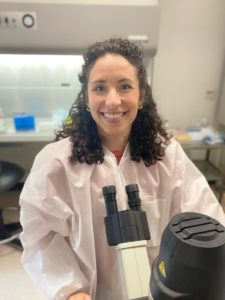We are pleased to announce the 2022 funded projects through the UW Nutrition Obesity Research Center Pilot and Feasibility (P&F) Award programs:
2022 UW NORC P&F RECIPIENTS:
 Dr. Kimberly Alonge, PhD, has been awarded a two-year Pilot and Feasibility Award through the UW Nutrition Obesity Research Center for her project entitled: “Role of hypothalamic PNNs in nutrient and hormone sensing dysfunction in obesity.”
Dr. Kimberly Alonge, PhD, has been awarded a two-year Pilot and Feasibility Award through the UW Nutrition Obesity Research Center for her project entitled: “Role of hypothalamic PNNs in nutrient and hormone sensing dysfunction in obesity.”
Dr. Alonge received her PhD in Biochemistry and Molecular Biology at West Virginia University. She then conducted her postdoctoral studies at the University of Washington within the Department of Medicine in the laboratory of Dr. Michael W. Schwartz. Dr. Alonge was recently promoted to an Assistant Professor of Medicinal Chemistry with a joint appointment in the School of Medicine’s Division of Metabolism, Endocrinology and Nutrition at the University of Washington. Her research focuses on understanding the functional significance of extracellular matrix changes in metabolic and neurological diseases.
Project description: That obesity and type 2 diabetes (T2D) are among the most pressing and impactful biomedical challenges confronting modern society highlights the need for an improved understanding of the underlying disease mechanisms. Growing evidence suggests that the central nervous system transduces input from circulating hormones and nutrients into neuronal responses that maintain energy- and glucose- homeostasis and that dysfunction in this system contributes to the pathogenesis of obesity and T2D. Recent work from the Alonge laboratory has found that perineuronal nets (PNNs), which are specialized matrices that regulate the connectivity and activity of neurocircuits, enmesh key neurons involved in the regulation of energy- and glucose metabolism in the hypothalamic arcuate nucleus. Her work further shows loss of PNNs in both mouse models of diet-induced obesity and in obese and diabetic humans. Dr. Alonge hypothesizes that the obesity and diabetes-associated loss of hypothalamic PNNs results in altered diffusion of charged factors, including hormones, nutrients, and other metabolites, within this critical brain region resulting in hormone- and nutrient-sensing dysfunction characteristic to metabolic impairments. The concept that hypothalamic PNNs may play a key functional role in hypothalamic sensing of hormones and nutrients through changes in extracellular space diffusion dynamics, and that defects in metabolite diffusion may contribute to the obesity and T2D pathogeneses, constitutes an innovative area of research at the interface of metabolism and neuroscience with relevance to future therapy development.
 Dr. Oleg Zaslavsky, PhD, MHN, RN, has been awarded a two-year Pilot and Feasibility Award for his project entitled: “Pilot Evaluation of a Mobile Intervention to Support Mediterranean Diet (MedD) for Persons with Mild Alzheimer Disease and Alzheimer Disease Related Dementia’s (AD/ADRD) and Frailty.”
Dr. Oleg Zaslavsky, PhD, MHN, RN, has been awarded a two-year Pilot and Feasibility Award for his project entitled: “Pilot Evaluation of a Mobile Intervention to Support Mediterranean Diet (MedD) for Persons with Mild Alzheimer Disease and Alzheimer Disease Related Dementia’s (AD/ADRD) and Frailty.”
Dr. Zaslavsky obtained his Bachelor of Science at the University of Haifa, Israel before completing his doctoral degree from the University of Washington School of Nursing focused on advanced statistics and frailty. Dr. Zaslavsky is currently an Associate Professor within the School of Nursing at the University of Washington. His research focuses on developing digital tools to promote health in older adults with frailty and dementia.
Project description: Frailty, Alzheimer’s Disease (AD), and AD-related dementias are progressive conditions that disproportionally affect the same age group and share many risk factors and clinical features. Given that no treatments prevent or slow the progression of dementia, frailty might be a practical target for interventions to reduce the severity of the cognitive decline in persons with dementia. Lifestyle interventions such as healthy eating reduce risks of frailty and brain degeneration. The Mediterranean diet (MedD) is especially pertinent because of its cardioprotective, anti-inflammatory, and pro-metabolic properties, all of which are linked to the physiology of frailty and AD. In fact, observational and intervention studies have consistently shown that people adhering to MedD have less frailty, better brain morphology, and higher function. However, unfortunately, most MedD interventions are limited for implementation at the population level because of the high cost. This project is focused on the development of a mobile behavioral intervention to improve adherence to MedD for adults age 65 and older with mild-to-moderate frailty. The ultimate goal is to support population-level scalable and affordable interventions for secondary dementia risk reduction.
2022 UW NORC ADVANCE P&F RECIPIENTS:
 Dr. Barbara Juarez, PhD, has been awarded a one-year ADVANCE P&F Award, which targets early career scientists from underrepresented groups. The title of her project is: “Effect of a high-fat diet on VTA dopamine neuron activity and behavior.”
Dr. Barbara Juarez, PhD, has been awarded a one-year ADVANCE P&F Award, which targets early career scientists from underrepresented groups. The title of her project is: “Effect of a high-fat diet on VTA dopamine neuron activity and behavior.”
Dr. Juarez completed a Bachelor of Sciences Degree in Biological Sciences at Florida International University, Miami, FL before receiving her PhD in Neuroscience at Icahn School of Medicine at Mount Sinai, New York, NY. She is currently a postdoctoral research fellow in the Department of Psychiatry & Behavioral Sciences and Pharmacology at the University of Washington, Seattle WA in the laboratory of Dr. Larry Zweifel. Dr. Juarez studies the neural circuits that regulate reward seeking behaviors.
Project description: Overconsumption of high calorie, palatable food plays an important role in the etiology of obesity. Growing evidence suggests that this effect is mediated, in part, by the mesolimbic reward system which increases the drive and motivation of feeding behaviors. Specifically, the ventral tegmental area (VTA) receives input from brain regions involved in feeding and satiety and regulates dopamine release in the nucleus accumbens (NAc) to regulate reward. In the setting of high-fat, diet-induced obesity, dopamine signaling is reduced, while associations of cues and contexts to food reward is increased. Work from the Zweifel laboratory has recently found that corticotrophin releasing hormone receptor-1 (Crhr1) VTA dopamine neurons project to the NAc core and are critical to the ability to link cues and food reward associations, while cholecystokinin (Cck) VTA dopamine neurons project to the NAc mShell and are necessary for motivational drive for food reward. This project seeks to determine the effects of high-fat diet feeding on these VTA dopamine neuron subpopulations and if disrupting dopamine activity in these subpopulations impacts feeding behaviors.
 Dr. Ana Valencia, PhD, has been awarded a one-year ADVANCE P&F Award, which targets early career scientists from underrepresented groups. The title of her project is: “The role of mitochondrial metabolism in weight loss in the context of obesity.”
Dr. Ana Valencia, PhD, has been awarded a one-year ADVANCE P&F Award, which targets early career scientists from underrepresented groups. The title of her project is: “The role of mitochondrial metabolism in weight loss in the context of obesity.”
Dr. Valencia received a doctorate in Kinesiology and Exercise Physiology in 2017 from the University of Maryland. She subsequently accepted a postdoctoral fellowship position at the University of Washington, Seattle WA in the laboratory of Dr. David Marcinek within the Department of Radiology. Dr. Valencia studies the effects of nutritional stress on mitochondrial function and metabolism
Project description: Weight loss reduces the burden of cardiometabolic risk factors in people with obesity and is currently one of the leading recommendations to improve metabolic health. However, following weight loss, the ability to further lose weight, let alone maintain weight loss is a common frustration amongst dieters and prevents long-term protection against cardiometabolic risk. Following behavioral weight loss, people experience a spontaneous weight loss plateau. During this period, it is difficult to lose more weight, and there is an increased susceptibility to regaining weight, thereby losing the cardiometabolic benefits. The physiology of the weight loss plateau is currently underexplored and may provide key insights into the mechanisms that make it challenging for people with obesity to achieve long-term metabolic health after weight loss. While waning adherence to prescribed diets likely contributes to a plateau, recent work from Dr. Valencia suggests an important role for mitochondrial function. Dr. Valencia hypothesizes that the plateau phase during weight loss is marked by reduced mitochondrial metabolism which increases the susceptibility to weight regain and cardiometabolic risk. To test this, Dr. Valencia will use a translational systems approach integrating clinical samples from NIH-funded weight loss studies in collaboration with Dr. Ellen Schur, with controlled animal studies to assess the relationship between mitochondrial function and energy expenditure and cardiometabolic risk in collaboration with Drs. Gregory Morton and Karin Bornfeldt.
